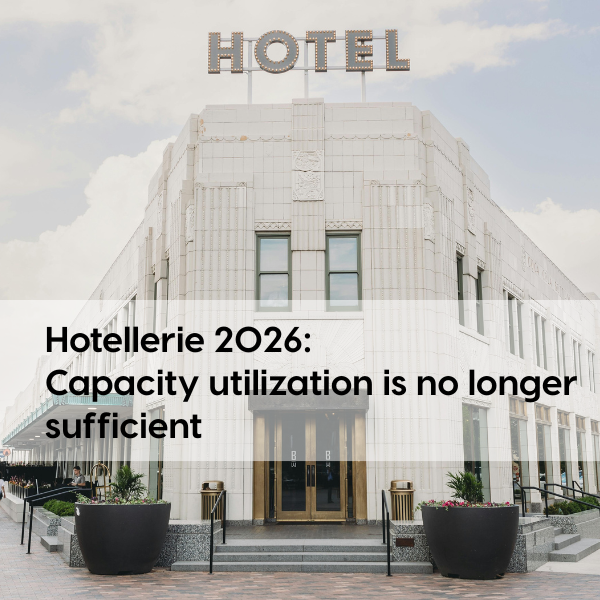Tourismus & Hotellerie
Full beds, empty accounts
How rising costs are slowing down the upswing in the hotel industry

The guests are back, the booking situation is pleasing — but the economic situation of many hotels remains tense. Despite occupancy figures at pre-pandemic level, hoteliers rate their financial situation worse than in the previous year.
This shows the current Tourism barometer 2025 by Deloitte Austria and the Austrian Hotel Association (ÖHV). Hotels are under pressure — in the midst of a high demand.
The reason for this paradoxical situation lies primarily on the cost side: personnel, energy, goods — everything is becoming more expensive. At the same time, a large part of this additional burden cannot be passed on to guests. In particular, wage increases in recent years have noticeably eroded the operating profitability of many houses. According to the study, four out of ten companies expect the economic situation to deteriorate further — despite good occupancy.
“Good overnight figures are useless if no money remains in the account in the end,” warns Andreas Kapferer from Deloitte Tirol. A sentence that sums up the reality of many companies.
Investments on hold, loans under pressure
At the same time, a second problem area is beginning to block operational development: There are no investments. 42 percent of the companies surveyed have already reduced or canceled planned projects, and a further 35 percent are planning restrictions in the near future. This is particularly tricky in an asset-intensive sector such as the hotel industry, which depends on structural quality and continuous modernization in order to remain competitive.
In addition, financing is becoming a stumbling block. Almost every second company says they are confronted with stricter credit conditions — including higher security requirements. The combination of declining profitability and difficult borrowing is putting many companies in a strategic impasse.
ÖHV Secretary General Markus Gratzer also warns against reducing investments due to short-term saving pressure. Anyone who saves money permanently on maintenance and development jeopardizes the competitiveness of their own offering in the long term.
Costs rise when there is a shortage of staff
The economic situation is further aggravated by a structural bottleneck that runs across all categories: the shortage of skilled workers. A lack of personnel is not only reflected in service quality, but also increases operating costs — for example through overtime, temporary employment or inefficient processes.
It is therefore all the more important to operate efficiently with the existing team and to use resources where they create real added value. Digital assistance systems in the back office — whether in accounting, controlling or forecasting — are thus taking on a new role: They are not an addition, but a prerequisite for stable processes.
From gut feeling to real-time control
Many hotels still make their decisions based on their gut instincts, or on the basis of monthly evaluations, manual Excel sheets or external reports. But in a volatile environment with narrow margins, that is no longer enough.
What is required now is real-time data, operational transparency and a strategic overview.
This is where the trend towards digital controlling platforms starts — for example profitize, an AI-based solution that integrates all financial, personnel, energy and booking data on a single, intuitive interface. Instead of wild Excel growth, the system provides precise forecasts, early warning indicators and concrete recommendations for cost optimization — based on live data.
Modern systems help to identify cost drivers at an early stage and take targeted countermeasures — for example in the event of discrepancies in the use of goods, personnel costs or unexpected sales developments. Instead of months of delays, decision makers receive up-to-date transparency — a decisive advantage in a low-margin environment.
Digitalization as a factor of stability
Smaller companies in particular hesitate when it comes to digitization due to fear of costs or complexity. But in times of crisis, it is clear that anyone who has clear data can make smarter decisions. And anyone who analyses automatically can deploy personnel in a more targeted manner and minimize sources of error.
In addition, resistance to technology is often unfounded: Modern tools can be integrated into existing systems, are cloud-based, modular and designed specifically for small to medium-sized companies. The fear of complexity quickly loses its terror in the face of concrete relief.
Studies show that digital systems in the hotel industry do not replace people, but free them up: for personal service, for innovation, for what makes a stay unforgettable.
Those who create clarity today strengthen their future
The hotel industry is operationally strong — but the economic environment requires new answers. In times of growing uncertainty, there is no need for further guts, but reliable figures. If you want to plan your margins, your liquidity and your next steps, you need to know where you stand — not at some point, but now.
The good news is that there are tools that help you do just that. Digitalization and intelligent financial planning are no longer topics of the future — they are now a decisive lever for strengthening one's own position, identifying opportunities and thinking boldly forward.
Oder kontaktieren Sie uns.
Simply contact us via email. We look forward to hearing and reading from you.
hello@profitize.io

.png)

.png)
.png)
.png)
.png)
.png)
.png)
.png)

.png)
.png)
.png)
.png)
.png)
.png)
.png)
.png)
.png)
.png)

.png)
.png)
.png)
.png)
.png)

.png)
.png)
.png)


.png)
.png)
%20(600%20x%20400%20px).png)
%20(800%20x%20600%20px).png)

.png)



.png)



